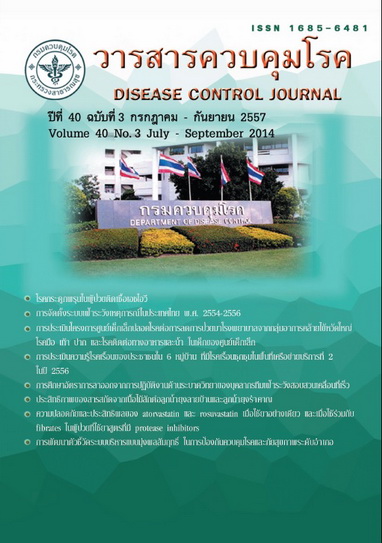Development the result based management in Disease Prevention and Control Index in the District Level
DOI:
https://doi.org/10.14456/dcj.2014.16Keywords:
development index, result based management, disease prevention and controlAbstract
This descriptive research aimed to develop Disease Prevention and Control Index in the District Level and to evaluate the result based management in Disease Prevention and Control Index in the District Level. This study was scoped into 2 steps, including (1) To develop the index. : (1.1) study the Result Based Management in Disease Prevention and Control Index in the District Level and the suggestion from the experts were included 6 components to the draft of index; (1.2) the verify and evaluation by seminar form experts. (2) the evaluation of the result based management in Development the Result Based Management in Disease Prevention and Control Index that qualify in this samples such as network, responsible staff both province and district level. The data involved the 182 questionnaire. The results was utilized by selecting the index that indicated the mean score at least 3.51 and standard deviation less than 1. The results revealed that develop Disease Prevention and Control Index in the District Level included 6 components and total 106 indicators. The proper evaluation index were remained 96 indicators and the possible evaluation index also were remained 63 indicators. The priority results indicated that (1) the strategic planning; (2) The leader of the organization; (3) The important clients and streak holders; (4) The process of management; (5) The human resource management; (6) The analysis and knowledge management. Suggestion of this research was appointed criteria of indicators about the result and scoring method for evaluated the result based management in Disease Prevention and Control Index in the District Level.
Downloads
References
2. มังกร หริรักษ์. รูปแบบการบริหารแบบมุ่งผลสัมฤทธิ์ในสถานศึกษา สังกัดสำนักงานคณะกรรมการการอาชีวศึกษา [วิทยานิพนธ์ปริญญาดุษฎีบัณฑิต]. พิษณุโลก: มหาวิทยาลัยนเรศวร; 2555.
3. นพดล เกษจรัล, ไพรัตน์ อ้นอินทร์. สถานการณ์และข้อเสนอแนวทางการบริหารแบบมุ่งผลสัมฤทธิ์ในการป้องกันควบคุมโรคระดับอำเภอ. วารสารวิชาการป้องกันควบคุมโรค สคร.9 พิษณุโลก 2556;1:15-28.
4. ทศพร ศิริสัมพันธ์. “การบริหารผลการดำเนินงาน (Performance Management)” รวมบทความวิชาการ 100 ปี รัฐประศาสนศาสตร์ไทย. กรุงเทพมหานคร: ภาควิชารัฐประศาสนศาสตร์ คณะรัฐศาสตร์ จุฬาลงกรณ์มหาวิทยาลัย; 2543.
5. ดนัย เทียนพุฒ. ดัชนีวัดผลสำเร็จธุรกิจ. กรุงเทพมหานคร: บริษัท นาโกต้า จำกัด; 2544.
6. บดินทร์ วิจารณ์. ชุดเครื่องมือการพัฒนาองค์กร (organization improvement toolkits) ตามแนวทางการพัฒนาคุณภาพบริหารจัดการภาครัฐ หมวด 4 การวัด การวิเคราะห์ และการจัดการความรู้. กรุงเทพมหานคร: บริษัท วิชั่น พริ้นท์ แอนด์ มีเดีย จำกัด; 2551.
7. จิราภร เกสรสุจริต. การทำงานให้บรรลุผลสัมฤทธิ์ ในเอกสารประกอบการฝึกอบรมหลักสูตรเสริมสร้างสมรรถนะหลักด้านการบริหารสำหรับนักบริหารระดับสูง. นนทบุรี: สถาบันพัฒนาข้าราชการพลเรือน; 2545.
8. รัชวรรณ กาญจนปัญญาคม. ชุดเครื่องมือการพัฒนาองค์กร (organization improvement toolkits) ตามแนวทางการพัฒนาคุณภาพบริหารจัดการภาครัฐ หมวด 6 การจัดการกระบวนการ. กรุงเทพมหานคร: บริษัท วิชั่น พริ้นท์ แอนด์ มีเดีย จำกัด; 2551.
9. ระวิวรรณ โพธิ์วัง. การประสานงานและการสร้างเครือข่าย. กรุงเทพมหานคร: ธนาเพลส แอนกราฟฟิก; 2545.
Downloads
Published
How to Cite
Issue
Section
License
Articles published in the Disease Control Journal are considered as academic work, research or analysis of the personal opinion of the authors, not the opinion of the Thailand Department of Disease Control or editorial team. The authors must be responsible for their articles.






